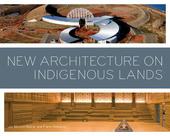
|
New Architecture on Indigenous Lands
Paperback / softback
Main Details
| Title |
New Architecture on Indigenous Lands
|
| Authors and Contributors |
By (author) Joy Monice Malnar
|
|
By (author) Frank Vodvarka
|
| Physical Properties |
| Format:Paperback / softback | | Pages:272 | | Dimensions(mm): Height 203,Width 254 |
|
| Category/Genre | History of architecture |
|---|
| ISBN/Barcode |
9780816677450
|
| Classifications | Dewey:720.973 720.8997 |
|---|
| Audience | |
|---|
|
Publishing Details |
| Publisher |
University of Minnesota Press
|
| Imprint |
University of Minnesota Press
|
| Publication Date |
29 July 2013 |
| Publication Country |
United States
|
Description
Black Elk speaks of the "square boxes" his people were forced into, and Winona LaDuke of the "boxes of mints" on Native lands. As long as the government was deciding what tribal buildings should look like, Native custom and culture were bound to be boxed in-or boxed out. But in the post-1996 era of more flexible housing policies, Native peoples have assumed a key role in the design of buildings on tribal lands. The result is an architecture that finally accords with the traditions and ideas of the people who inhabit it.
Author Biography
Joy Monice Malnar, AIA, is associate professor of architecture at the University of Illinois at Urbana-Champaign.
Reviews"Libraries that support architecture programs will find this book to be an excellent addition."-Art Libraries Society of North America "New Architecture offers many fascinating anecdotes drawn from the long history of encounters between native tribes and Euro-Americans. With its beautiful photography and insightful commentary, there is much here of great interest to both architects and fans of architecture. Perhaps the book's introduction says it best: 'These are buildings worth knowing about.' "-Community Reporter "A welcome addition to the growing body of literature devoted to the importance of the arts as a means of cultural expression and revitalization for indigenous peoples. A worthy volume that deserves attention from both the scholarly crowd and the lay public."-Journal of Tourism and Cultural Change "The true value of this book lies in its extensive testimonies regarding best practices. Those who have worked in the field understand the myriad of non-standard procedures related to design, consultation, and approval. The authors have done their research, balancing it with the necessary historical, legal and economic framework."-The Canadian Architect "The authors quote tribal members and architects with an emphasis on the direct links between stakeholders' cultural values and design decisions. The focus is on the aesthetics and functionality of the architecture as it relates to, or is derived from a particular people or group of peoples."-Tribal College Journal "That 'tribal groups are clearly communicating their cultural needs and values to designers who are listening' is the thesis of this work by Malnar and Vodvarka. Over ten chapters, the authors examine the cultural lifestyles of indigenous communities through new architecture, using 56 projects as case studies. Each chapter delves into indigenous architectural history, and meetings held with tribal members as part of the design process."-Choice "Overall, the book is successful in that it breaks new, academic ground for Indigenous architecture within the ongoing conversation about mainstream architecture. In addition, Malnar and Vodvarka rely on Native American studies scholarship, in many cases the work of Indigenous scholars, to support their argument."-First American Art Magazine "Marvelously illustrated and comprehensively written. This ambitiously wide-ranging and invitingly designed book ... overflows with stunning color photos, color drawings, and project plans."-Buildings & Landscapes
|